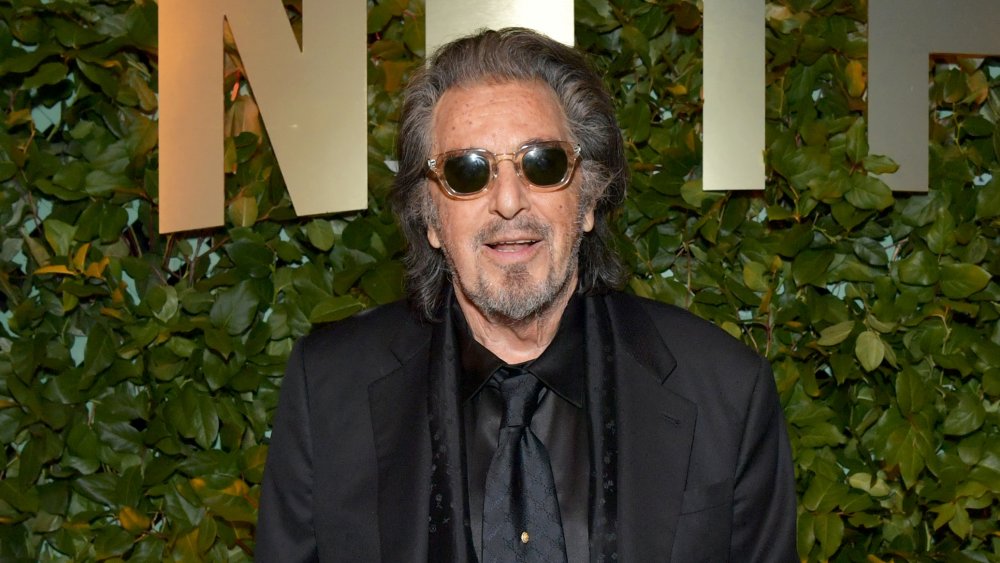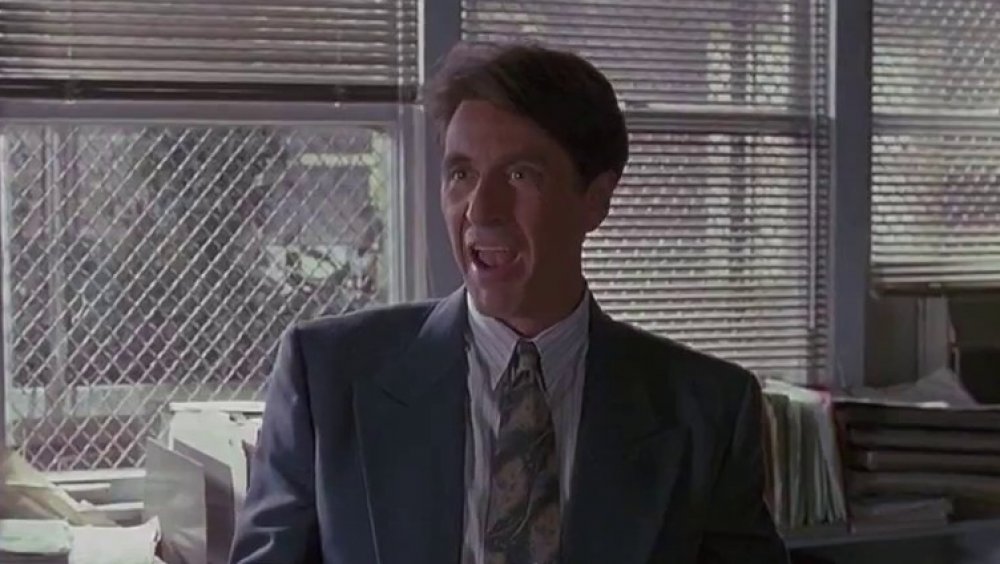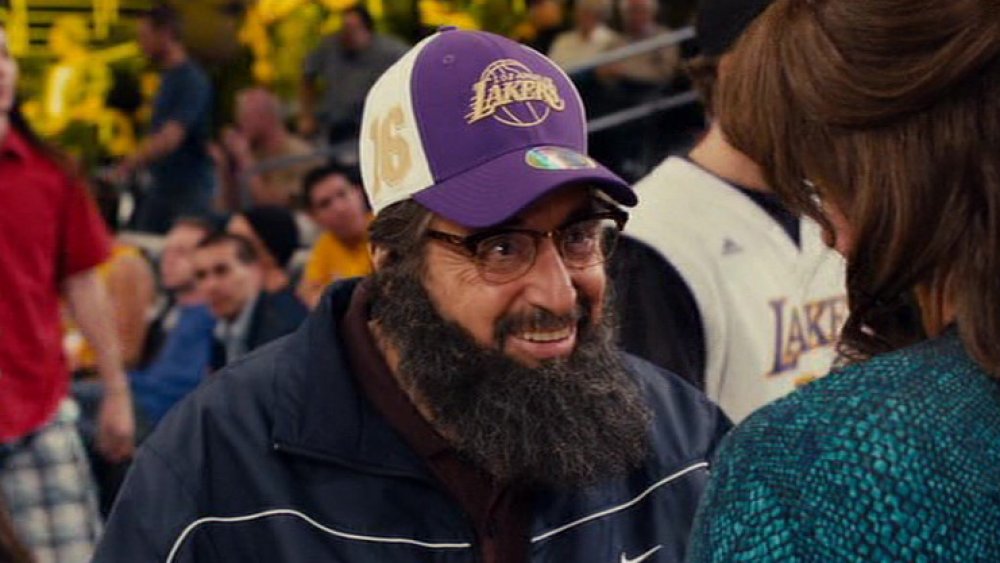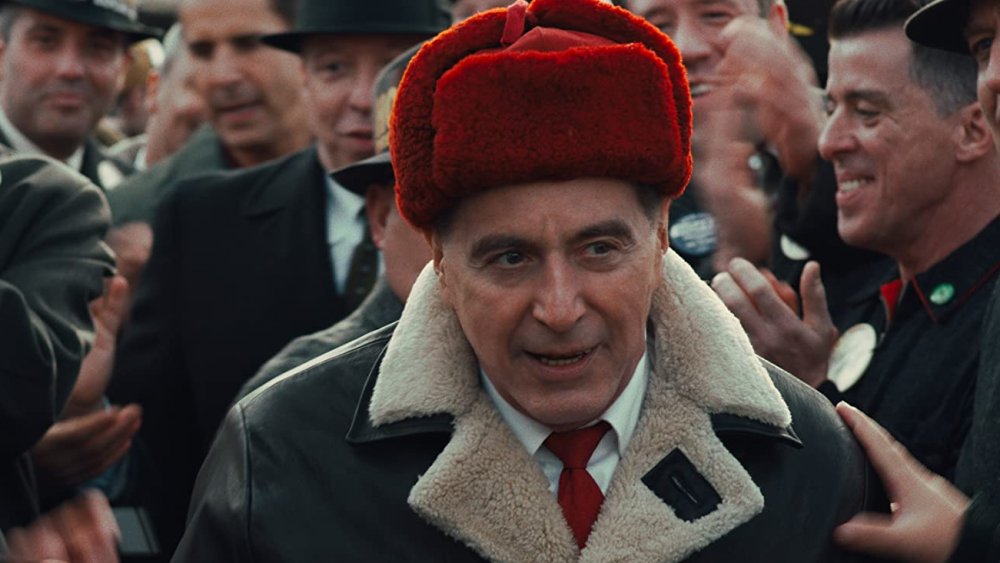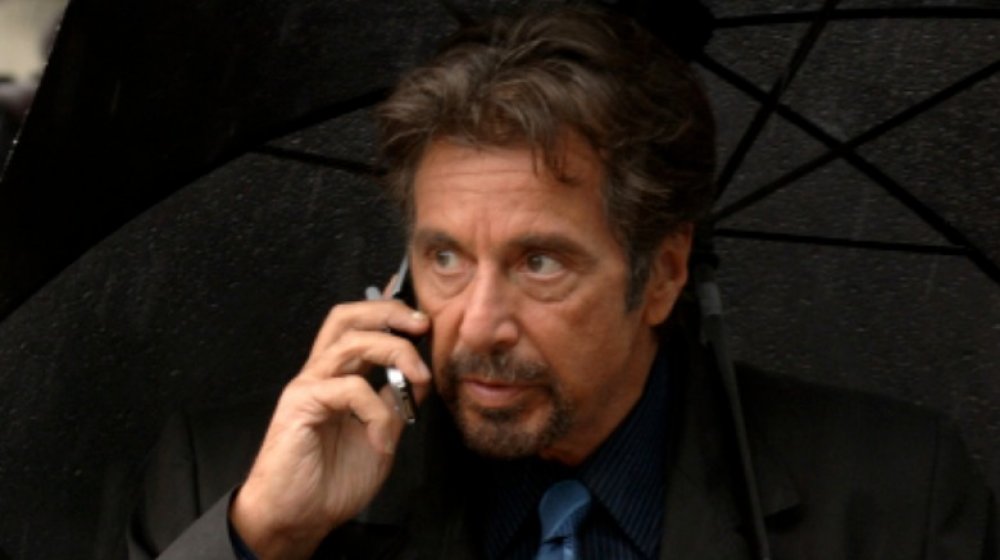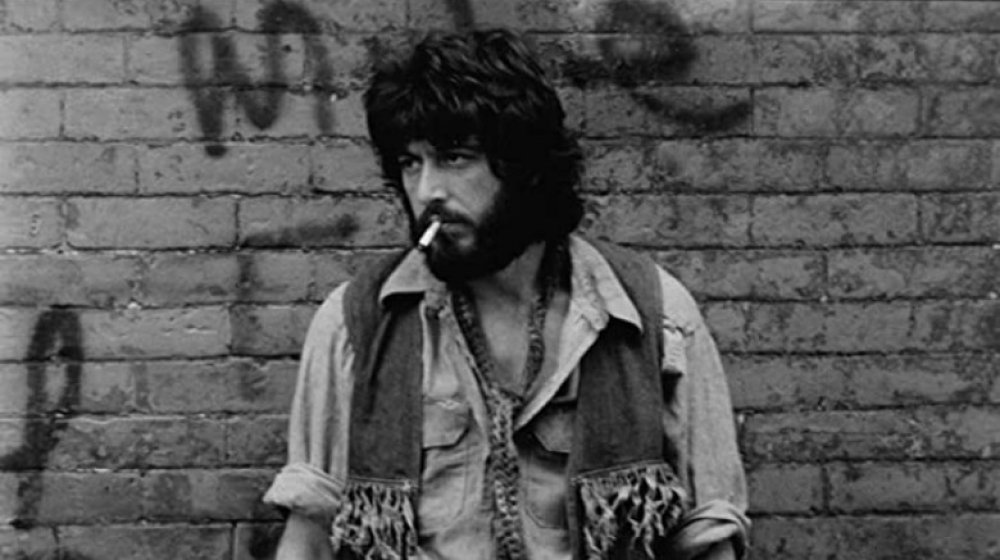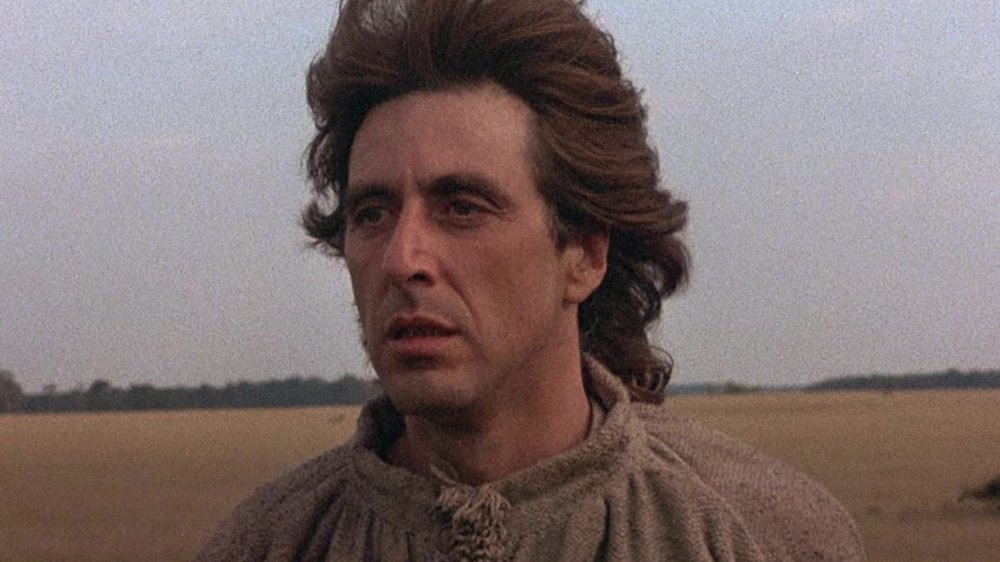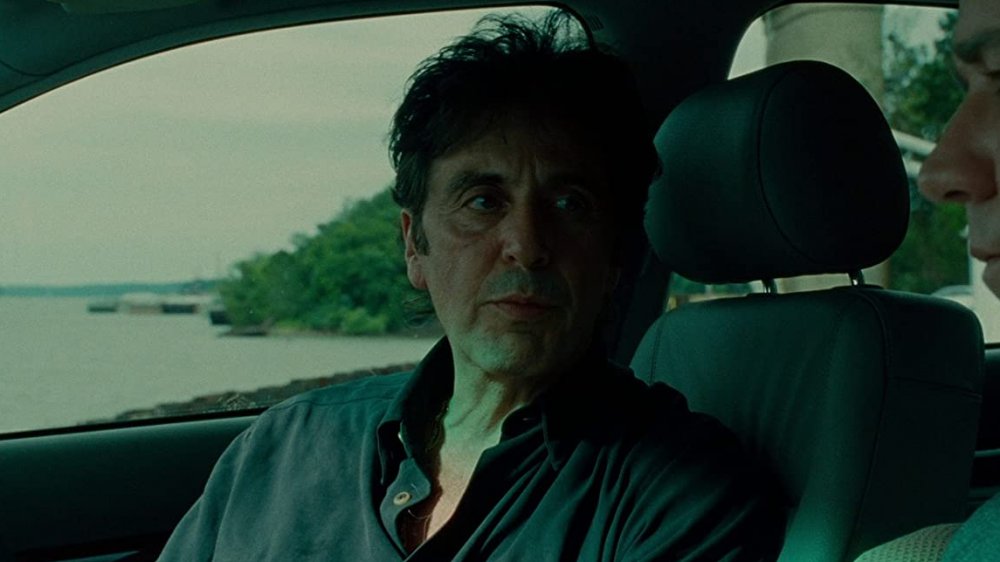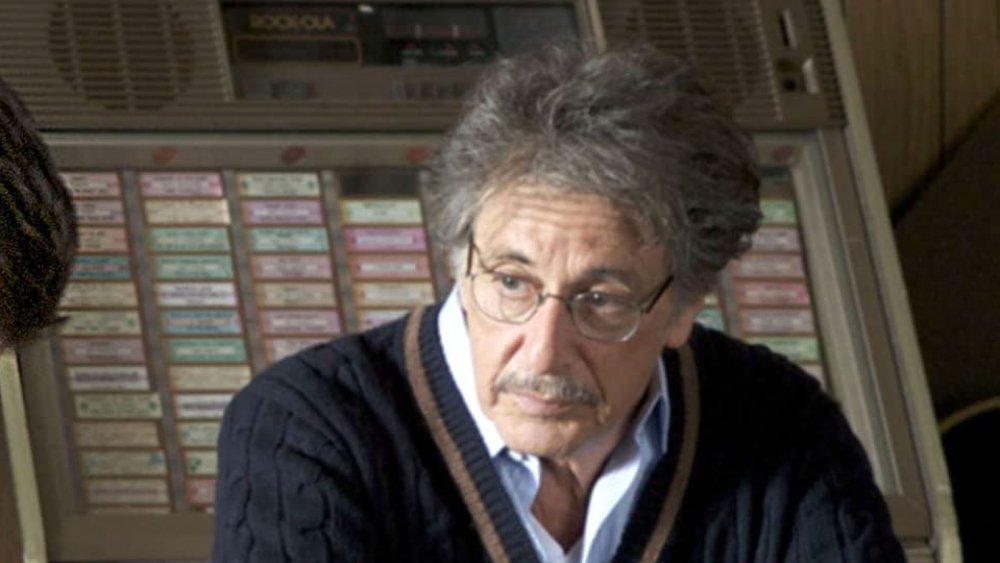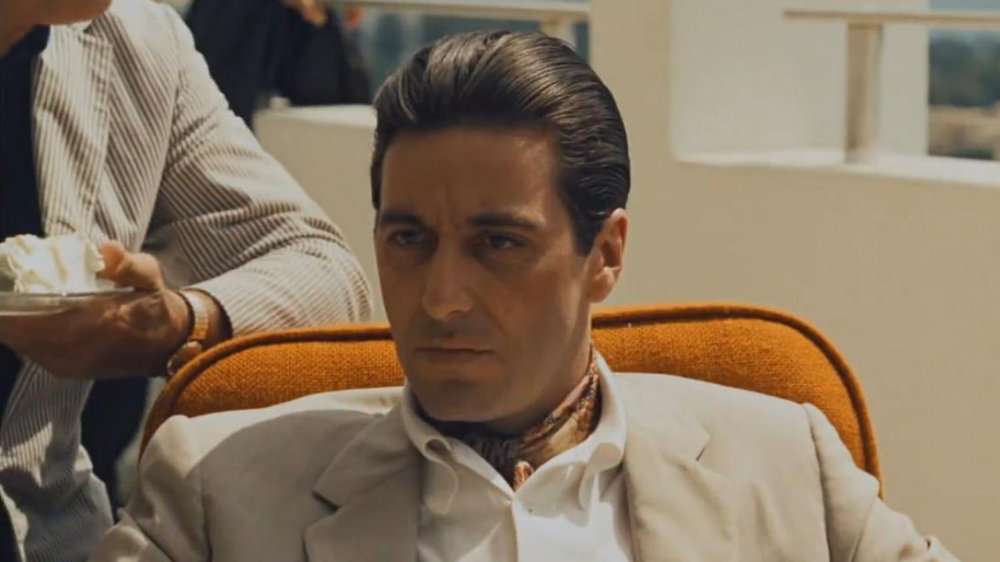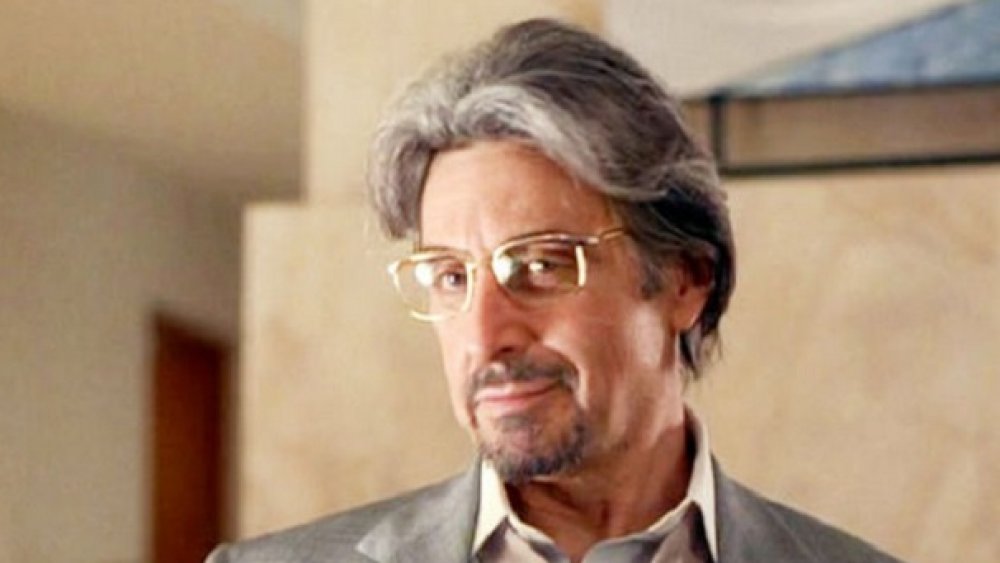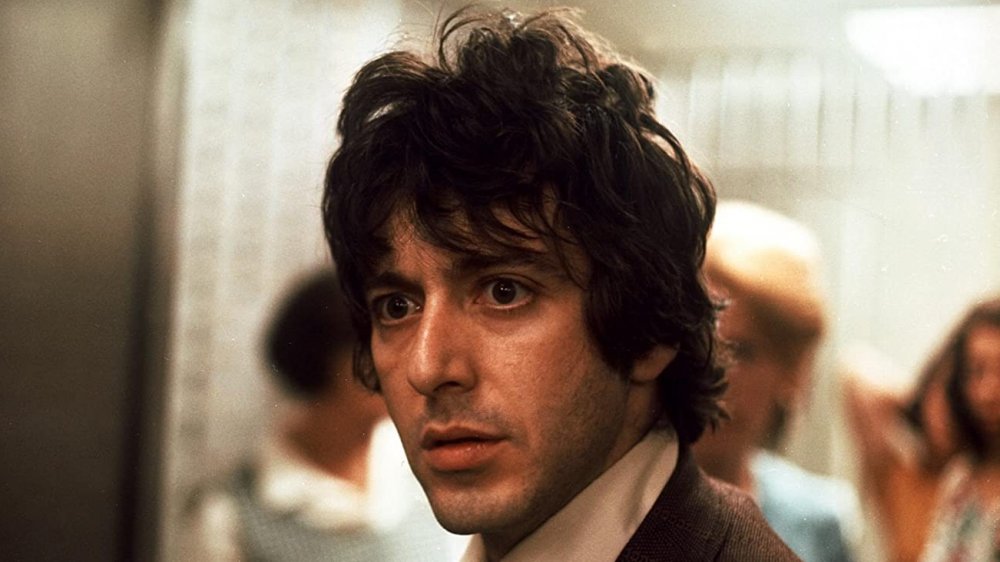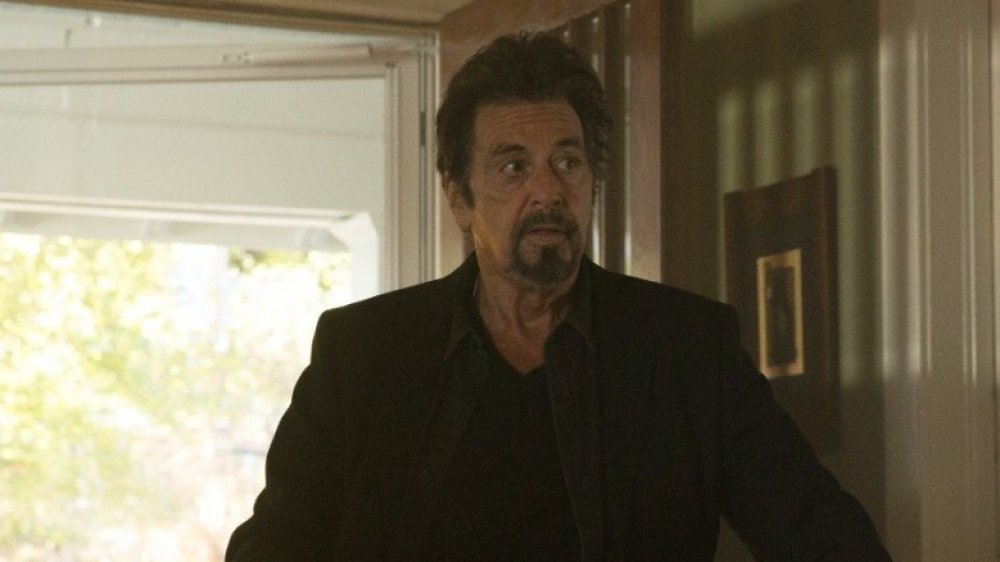Best And Worst Al Pacino Movies
Al Pacino is one of the most honored and revered actors of all time. He's best known for his intense performances, especially in gangster films, but don't think he's some one-trick pony — Pacino has shown plenty of versatility over his decades-spanning career. Case in point: Pacino is one of a select group of actors who have won the coveted "Triple Crown" of acting, meaning he's won an Oscar (for Scent of a Woman), an Emmy (for Angels in America and You Don't Know Jack), and a Tony (for Does a Tiger Wear a Necktie? and The Basic Training of Pavlo Hummel). Now that's range.
How did he climb so high? Pacino swings for the fences with his roles — a choice that does not always turn out spectacularly. Pacino has a whole lot of iconic movies under his belt ... but he's also made a few real stinkers. Today, we're exploring Pacino's impressive filmography — specifically, his highest highs and lowest lows. These are the Pacino movies you absolutely need to see, and the ones that you should avoid at all costs.
BEST: Glengarry Glen Ross
Glengarry Glen Ross is one of those movies everyone needs to see. It's got a little bit of everything: An amazing cast, a terrific screenplay adapted from a Pulitzer Prize-winning play by David Mamet, an incredibly tense plot, and one of the most iconic scenes of all time. Amazingly, Alec Baldwin's infamous speech (and his entire character, Blake) never appear in the original play!
Despite Baldwin's movie-stealing scene, Pacino does a lot of the heavy lifting here. He plays Ricky Roma, the top salesman at a cutthroat real estate agency where most of the agents are nothing but con artists. One day, the agents are told that their monthly sales numbers will result in the worst two salesmen getting fired. Things quickly go off the rails: Glengarry Glen Ross takes more than a few sudden turns before it's all said and done. Pacino is great in the film, ablaze with swagger, irritation, and poise. The quality of the cast, which includes Jack Lemmon, Ed Harris, Alan Arkin and Jonathan Pryce, enhances his performance — he's got a whole lot of talent to bounce off of. Despite the film's pedigree, it remains a movie many haven't seen. Take it from us: It's worth making time for.
WORST: Jack and Jill
Jack and Jill is an infamously terrible movie. Mary Pols, who reviewed it for Time, summed it up entirely when she said the film made her feel "dead inside." The plot revolves around a pair of siblings named Jack and Jill, who are both played by Adam Sandler. If a double dose of Adam Sandler at his worst doesn't frighten you off immediately, then you're made of sterner stuff than most of us.
Jack is an advertising executive who is trying to land a major spokesman for Dunkin' Donuts. He sets his sights on Al Pacino, who plays himself. Jack has also decided to try to find a boyfriend for his twin sister, who is an obnoxious, oblivious fool. Surprisingly,Pacino falls in love with Jill, and Jack tries to kill two birds with one stone by hooking the two up. This eventually leads to Jack disguising himself as his own twin sister to string Al Pacino along. Yikes.
Pacino gives it his all, as he typically does, but he just doesn't have a lot to work with. Jack and Jill could conceivably be a good drinking game movie — it was the first film to completely sweep the Razzie Awards – but that might be the only way to truly enjoy it.
BEST: The Irishman
The Irishman had a lot riding on it when it was released in 2019. Martin Scorsese's epic (three-and-a-half hours long) and expensive (final budget estimates hover around $225 million) crime drama was a major gamble for Netflix on a variety of levels. Luckily, The Irishman met the public's expectations. It's now considered one of Scorsese's best, and hey — that runtime is a lot easier to handle with a pause button at hand.
The film's plot concerns itself with a man named Frank Sheeran (played by Robert DeNiro), who works his way up through the rank and file of the Philadelphia mob during the rise of Jimmy Hoffa and the teamsters. Al Pacino plays Hoffa, bringing his fiery charisma and bombast to a very difficult role. Hoffa could easily come off as a paranoid wannabe, but Pacino is nuanced enough to make it work: You buy into his character, and ultimately spiral alongside him as things tumble out of control. The Irishman has already become established as one of the all-time great mob movies, another classic from Scorsese, and yet another star turn from Pacino.
WORST: 88 Minutes
The 2000s were an odd time for Pacino and 88 Minutes is a great example of why. It has an interesting premise and a great cast — besides Pacino, it features Alicia Witt, Leelee Sobieski, and William Forsythe — but it just never really comes together. New York magazine called it a "galumphing serial-killer picture" that is "dumb enough to be straight out of the parodies in Forgetting Sarah Marshall," and, well, that's about right.
Pacino plays Dr. Jack Gramm, a forensic psychiatrist whose testimony condemns a serial killer known as "the Seattle Slayer" to death row. Nine years later, the day the Slayer is set to be executed, Gramm receives a phone call saying he has 88 minutes left to live. The movie becomes a race against time as he attempts to find out who is trying to take revenge on him — and why.
88 Minutes struggles for a number of reasons, but the main one is that there isn't a lot of mystery. It just doesn't take much to figure out which suspect is after Gramm, and without that central question, the movie's appeal is thin. Despite these struggles, Pacino puts on a fine performance — and sports some of the most elegantly coiffed hair of his entire career.
BEST: Serpico
Pacino has won exactly one Oscar for Best Actor in his entire career. Somehow, he didn't win it for either of what are considered to be his best performances: His role in The Godfather films, and his role in Serpico. Serpico is rougher around the edges than Coppola's crime epic, but there are few movies that showcase an actor's talents more fully than Serpico does for Pacino.
Serpico is based on a novel that, in turn, is based on the life of a real-world NYPD officer named Frank Serpico. In the 1960s and 70s, Serpico helped to uncover and report several instances of police corruption and brutality in the NYPD. No matter where he went, he found officers accepting bribes and breaking laws to further their own interests. It wasn't long before reporting on his fellow officers caught up with him, and he found himself targeted by his own coworkers.
The movie's take on these events is absolutely spectacular, and Pacino is electric in the lead role. His iconic look (the 1970s were a good look on Pacino) and simmering energy are impossible to forget. He exudes anger, resignation, and battered dignity in every frame. It's easy to overlook Serpico for Pacino's flashier roles, but if you really want to see him at his best, this is the film to watch.
WORST: Revolution
Revolution is an absolute bear to watch, because you can see what it should have been. The public agreed: It had a budget of $28 million, but took in only $358 thousand before it was pulled from theaters. No one will argue that Revolution isn't an absolutely gorgeous film — it's full of beautiful, sweeping shots of the (ironically English) countryside. Unfortunately, its story is incoherent, and the acting (including Pacino's) is atrocious. Get out of here with that accent, Al!
Pacino plays a fur trapper named Tom Dobb who reluctantly joins the fight against the British during the Revolutionary War when his son is kidnapped. Donald Sutherland is in there, and Annie Lennox, of all people, makes an appearance as well. There's no shortage of talent whatsoever. But the story never comes together: At its core, it is hollow. Apparently, this might be because of how much was cut: The New York Times noted at the time that the film's two hour runtime is about half of what director Hugh Hudson wanted. Frankly, we can't imagine sitting through four hours of Pacino's bizarre accent. Feel free to skip this one unless you're on a quest to watch everything Pacino.
BEST: The Insider
It's easy to forget The Insider, as it precedes a downturn in Pacino's filmography. However, this film should absolutely not be included when discussing Pacino's lesser films. He reunites with Heat director Michael Mann here and, with an incredible performance from Russell Crowe thrown into the mix as well, The Insider is one of the best films of this list.
Pacino plays 60 Minutes producer Lowell Bergman in a story based on true events. The film follows Bergman and Jeffrey Wigand (Crowe), a tobacco company executive, as they are intimidated and attacked by forces within the tobacco industry. Christopher Plummer also stars as 60 Minutes correspondent Mike Wallace, adding yet another great performance to the film. The Insider is an intense and bizarre story, detailing the lengths to which major corporations will go to in order to keep their secrets hidden. Family tension, industry scapegoating, and the ever-present threat of violence are braided together by sterling performances into a tremendous whole. The Insider was nominated for seven Academy Awards, though it didn't win a single one –- this was a year dominated by The Matrix and American Beauty. Still, it's a worthwhile watch for anyone, especially those looking to enjoy a stellar turn from Pacino.
WORST: The Son of No One
The Son of No One started generating buzz at its very first screening — but not the good kind. Supposedly, it was shown to a handful of critics and industry insiders at Sundance 2011, only to have many of them walk out. Yikes. Apparently, the film went over much better with the general crowd at Sundance, but it's not hard to understand the first reaction: The Son of No One suffers from being contrived and, frankly, stupid.
The film stars Channing Tatum as a relatively green police officer named Jonathan White. White committed a murder in self defense as a young man, and the officer investigating it (played by Pacino) disposed of evidence because he was worried about the stigma that would be attached to White. In the present day, that secret threatens to come to the surface, and White has no clue who he can trust.
It could work, thought it would need some special performances and a good twist or two to keep things from getting too hokey. The Son of No One does not have those things. As a result, it becomes a boring, forgettable slog that practically crawls to a finish.
BEST: The Godfather: Part 1 and Part 2
We're lumping the first two Godfather films together, even though Part 2 is usually considered the superior film. Regardless of how you rank them, there's little doubt that they're both masterpieces, and that Pacino's performance as Michael Corleone is one of the best of his career.
Michael, the conflicted son of Vito, the Corleone patriarch, is a role that requires a nuanced approach. So much of the punch of The Godfather lies in the allure of absolute power, and how it can affect decent people. Michael actually tries to avoid getting into the "family business" altogether, but is pulled into it when his family is in danger. Pacino plays him with knife's-edge accuracy: Even today, his skill is jaw-dropping. Pacino stars in the third film as well -– he's still strong, but as everyone knows, it's not as good as the first two. But really, who cares? This is a lavish display of talent at its absolute peak. If you somehow haven't seen it, make watching The Godfather movies an immediate priority.
WORST: Gigli
Al Pacino has made a few terrible choices in his career, but few reach the depths of his decision to appear in Gigli. Made on a $54 million budget in 2003, Gigli stars then-couple Ben Affleck and Jennifer Lopez at the height of their reign as "Bennifer." The film was a disaster, getting brutally panned by critics and taking in only $7 million before being pulled from theaters. Gigli has not improved with time — if anything, it might have actually gotten worse.
Affleck plays a mobster named Larry Gigli, who is tasked with kidnapping a powerful federal attorney's disabled brother. Lopez's character, Ricki, is sent in to oversee this process. Of course, Ricki and Larry fall in love and run afoul of their boss, played by Pacino. The results are atrocious from every angle. The plot is asinine. Its portrayal of the attorney's younger brother is a gross caricature of disability. Ricki is introduced as a lesbian ... but, of course, she falls in love with Gigli anyway. The dialogue – chock-full of catchphrases like "Turkey Time" and "The Baywatch" — is laughable. Gigli is barely even drinking game-worthy. Don't bother with this one — no, not even to laugh at. It's that bad.
BEST: Dog Day Afternoon
Dog Day Afternoon is easily overlooked in Pacino's filmography, as it was his first movie after Serpico and The Godfather: Part 2. You absolutely should not sleep on this film, however: It's an intense piece of cinema and features Pacino at the top of his game.
Dog Day Afternoon is the story of one long day in the life of bank robber Sonny Wortzik. He and two partners immediately fumble things: One of them loses his nerve and runs, and they also discover that the bank has already had its money picked up for the day. It dawns on the duo how much risk they've put themselves in for almost no reward ... and then the police show up. What unfolds from there is fueled by the tension between the robbers, their hostages, the police, and the public's perception of the whole event. It's a thrill ride of a film that never slows down and keeps the audience guessing right up until the end. Pacino lights up every frame with talent, grit, and energy — it's no mystery, watching this, that he was only at the beginning of a long and glittering career.
WORST: Hangman
We barely even remembered that Hangman exists, let alone that it stars Pacino and Karl Urban. Perhaps it's best to just keep it that way: Hangman is a contrived, predictable and, frankly, dull film about a serial killer who bases his killings on the game Hangman. You know, the one where you have people fill in the blanks by guessing letters until they spell out a word? Yeah, this is that kind of movie.
Here are the basics: There's a killer on the loose, and his calling card involves carving letters into his victims and leaving little clues behind for the police to find. Pacino and Urban play the officers on the case, who start to realize the killer might have closer ties to them than they initially suspected. It's a bargain basement thriller, and Pacino and Urban seem to know it. But really, can you blame them? Again, this is the premise: A serial killer who bases his killings on Hangman. There is no way to make that as sinister as the screenwriters imagined it. The only thing that probably kept Hangman from meme infamy is that it came out the same year as The Snowman. "Mister Police" indeed.
